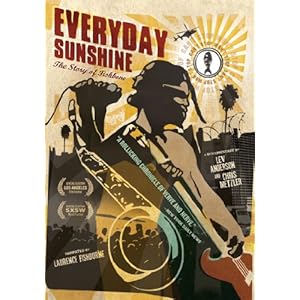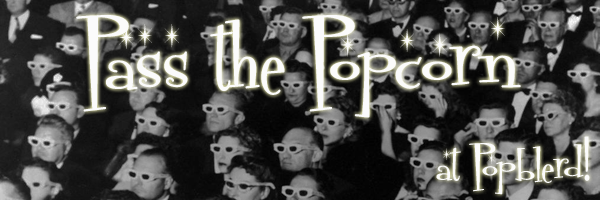 Documentaries that chronicle the rise, triumph, and inevitable fall from grace – and redemptive coda, if one is available – of an influential artist are often tricky propositions: VH1’s “Behind the Music” series pretty much cornered the market on this plotline early on, and subsequent efforts to subvert the formula either need to be either particularly innovative in style or to boast an interesting enough story to distinguish themselves. Take last year’s Pearl Jam Twenty, for example: an exemplary documentary, sure, and a fan essential, but it falls on the non-fan’s deaf ears. Films like Anvil!, Metallica doc Some Kind of Monster, and The Devil and Daniel Johnston, however, subvert theoretically bland roots by either being incredibly stylized (Daniel Johnston) or psychologically engaging (Anvil‘s portrayal of an influential group eluded by success but valiantly soldiering on, for example, or Monster‘s forthright and caustic therapy sessions).
Documentaries that chronicle the rise, triumph, and inevitable fall from grace – and redemptive coda, if one is available – of an influential artist are often tricky propositions: VH1’s “Behind the Music” series pretty much cornered the market on this plotline early on, and subsequent efforts to subvert the formula either need to be either particularly innovative in style or to boast an interesting enough story to distinguish themselves. Take last year’s Pearl Jam Twenty, for example: an exemplary documentary, sure, and a fan essential, but it falls on the non-fan’s deaf ears. Films like Anvil!, Metallica doc Some Kind of Monster, and The Devil and Daniel Johnston, however, subvert theoretically bland roots by either being incredibly stylized (Daniel Johnston) or psychologically engaging (Anvil‘s portrayal of an influential group eluded by success but valiantly soldiering on, for example, or Monster‘s forthright and caustic therapy sessions).
Everyday Sunshine: The Story of Fishbone (now available on DVD) doesn’t break the mold. It follows the tried and true “Behind the Music” formula in parallel tandem, chronicling both the rise and fall of the visionary L.A. black rock band’s genesis and creative ascent and the struggle of the current incarnation of the band to stay relevant, independent, and otherwise together. Still, it remains a valiant effort that fits comfortably into the sweet spot between “Behind the Music” and rock’s more creatively noteworthy documentaries: simply put, Everyday Sunshine chronicles a band so fundamentally exciting and aesthetically thrilling – and unearths so much high-energy, crackerjack concert footage to prove it – that any non-convert simply can’t help but leave the experience with a freshly-minted fandom.
Directors Lev Anderson and Chris Metzler are clearly in love with the subject of their movie. Freewheeling, sweat-drenched performances past and present are inserted into the narrative at will, as if to underscore the film’s fundamental thesis that everybody should probably love this band. Talking head interviews – from luminaries as varied as ?uestlove, Gwen Stefani, Tim Robbins, and Les Claypool – abound, many befuddled about how popular success has eluded such an electrifying and talented collective; much time is devoted to the financial struggles of original members Angelo Moore and Norwood Fisher, who continue to make music on their own terms even as few people seem to be listening, and to the struggle of their record company to find a box big enough to fit the group, who perfected a stylistic melange of punk, funk, ska, metal, and pop vast enough to give the average listener genre whiplash. Modern-day concert footage generally focuses on Moore, a childlike and often bizarre free spirit who morphs into an engaging performer onstage, still blessed with a sonorous and captivating singing voice that ping-pongs from Joe Strummer to Sly Stone to Corey Glover and back again; to his left, as always, stands the stalwart Fisher, a stoic and practical man who’s frenetic and accomplished bass playing interview subject Flea openly admits to having nicked for his own style. Fisher and Moore are flipsides of the same coin, Moore spacey and lively, Fisher straightforward and realistic, both upholding their musical partnership for the good of the music, and because they don’t know what else they can do at this point.
It’s kind of a tragic arc, really – neither I nor the documentarians nor Fishbone themselves can stress to you how excellent this band is – but the mood is generally lively, punctuated with strange little anecdotes about Moore’s irritating theremin obsession and founding guitarist Kendall Jones’ descent into religious fanaticism. It’s a compelling story, and one that’s often stretched a little too long (20 minutes could easily have been shaved, losing nothing in translation), but for all the dull stretches, Everyday Sunshine always has an interesting turn around the corner.
Early in the film, as band members past and present are ruminating on their roots and the band’s formation, long snatches of narrative are filled in with funny, low-rent, Laurence Fishburne-narrated animation. It’s a compelling tactic, one which is largely abandoned once the timeline coincides with the availability of actual video footage, but one which wouldn’t have hurt to keep around. As it stands, Everyday Sunshine isn’t quite sure of itself stylistically, but makes up for it with passion for a band that deserves a lot more than playing European parks to bored crowds of tourists.
Grade: B

